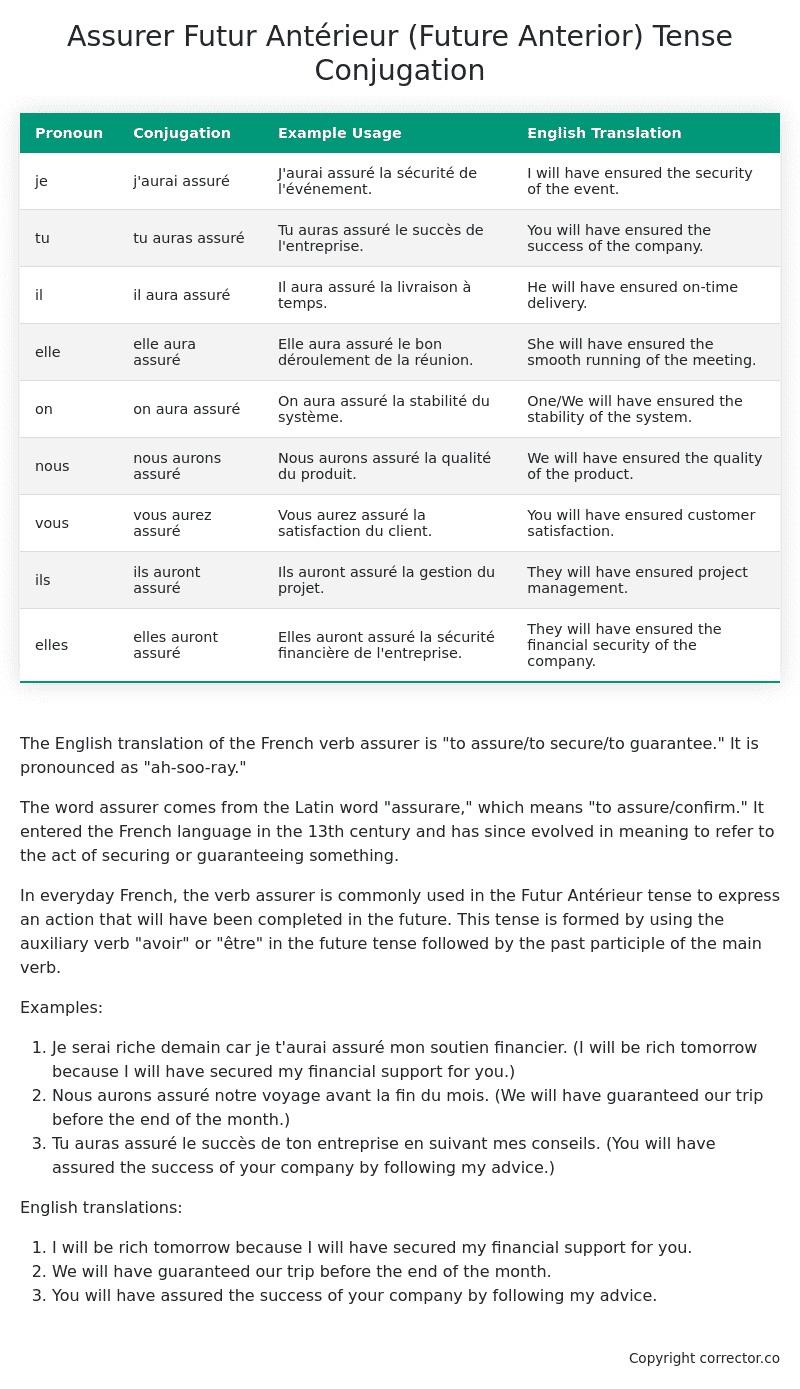Futur Antérieur (Future Anterior) Tense Conjugation of the French Verb assurer
Introduction to the verb assurer
The English translation of the French verb assurer is “to assure/to secure/to guarantee.” It is pronounced as “ah-soo-ray.”
The word assurer comes from the Latin word “assurare,” which means “to assure/confirm.” It entered the French language in the 13th century and has since evolved in meaning to refer to the act of securing or guaranteeing something.
In everyday French, the verb assurer is commonly used in the Futur Antérieur tense to express an action that will have been completed in the future. This tense is formed by using the auxiliary verb “avoir” or “être” in the future tense followed by the past participle of the main verb.
Examples:
- Je serai riche demain car je t’aurai assuré mon soutien financier. (I will be rich tomorrow because I will have secured my financial support for you.)
- Nous aurons assuré notre voyage avant la fin du mois. (We will have guaranteed our trip before the end of the month.)
- Tu auras assuré le succès de ton entreprise en suivant mes conseils. (You will have assured the success of your company by following my advice.)
English translations:
- I will be rich tomorrow because I will have secured my financial support for you.
- We will have guaranteed our trip before the end of the month.
- You will have assured the success of your company by following my advice.
Table of the Futur Antérieur (Future Anterior) Tense Conjugation of assurer
| Pronoun | Conjugation | Example Usage | English Translation |
|---|---|---|---|
| je | j’aurai assuré | J’aurai assuré la sécurité de l’événement. | I will have ensured the security of the event. |
| tu | tu auras assuré | Tu auras assuré le succès de l’entreprise. | You will have ensured the success of the company. |
| il | il aura assuré | Il aura assuré la livraison à temps. | He will have ensured on-time delivery. |
| elle | elle aura assuré | Elle aura assuré le bon déroulement de la réunion. | She will have ensured the smooth running of the meeting. |
| on | on aura assuré | On aura assuré la stabilité du système. | One/We will have ensured the stability of the system. |
| nous | nous aurons assuré | Nous aurons assuré la qualité du produit. | We will have ensured the quality of the product. |
| vous | vous aurez assuré | Vous aurez assuré la satisfaction du client. | You will have ensured customer satisfaction. |
| ils | ils auront assuré | Ils auront assuré la gestion du projet. | They will have ensured project management. |
| elles | elles auront assuré | Elles auront assuré la sécurité financière de l’entreprise. | They will have ensured the financial security of the company. |
Other Conjugations for Assurer.
Le Present (Present Tense) Conjugation of the French Verb assurer
Imparfait (Imperfect) Tense Conjugation of the French Verb assurer
Passé Simple (Simple Past) Tense Conjugation of the French Verb assurer
Passé Composé (Present Perfect) Tense Conjugation of the French Verb assurer
Futur Simple (Simple Future) Tense Conjugation of the French Verb assurer
Futur Proche (Near Future) Tense Conjugation of the French Verb assurer
Plus-que-parfait (Pluperfect) Tense Conjugation of the French Verb assurer
Passé Antérieur (Past Anterior) Tense Conjugation of the French Verb assurer
Futur Antérieur (Future Anterior) Tense Conjugation of the French Verb assurer (this article)
Subjonctif Présent (Subjunctive Present) Tense Conjugation of the French Verb assurer
Subjonctif Passé (Subjunctive Past) Tense Conjugation of the French Verb assurer
Subjonctif Imparfait (Subjunctive Imperfect) Tense Conjugation of the French Verb assurer
Subjonctif Plus-que-parfait (Subjunctive Pluperfect) Tense Conjugation of the French Verb assurer
Conditionnel Présent (Conditional Present) Tense Conjugation of the French Verb assurer
Conditionnel Passé (Conditional Past) Tense Conjugation of the French Verb assurer
L’impératif Présent (Imperative Present) Tense Conjugation of the French Verb assurer
L’infinitif Présent (Infinitive Present) Tense Conjugation of the French Verb assurer
Struggling with French verbs or the language in general? Why not use our free French Grammar Checker – no registration required!
Get a FREE Download Study Sheet of this Conjugation 🔥
Simply right click the image below, click “save image” and get your free reference for the assurer Futur Antérieur tense conjugation!

Assurer – About the French Futur Antérieur (Future Anterior) Tense
Construction
Common Everyday Usage Patterns
Interactions with Other Tenses
For example
Summary
I hope you enjoyed this article on the verb assurer. Still in a learning mood? Check out another TOTALLY random French verb conjugation!


